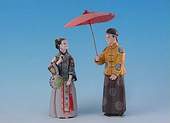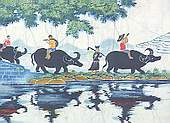 |
| Double-Seventh Day |

The Double-Seventh Day refers to the seventh day of the seventh month on the Chinese lunar calendar. The day is not as well known as many other Chinese festivals. But almost everyone in China, young and old, is very familiar with the story behind this festival.
A long long time ago, there was a poor cowherd, Niulang. He fell in love with Zhinu, “the Girl Weaver". Virtuous and kind, she was the most beautiful being in the whole universe. Unfortunately, the King and Queen of Heaven were furious finding out that their granddaughter had gone to the world of Man and taken a husband. Thus, the couple was separated by a wide swollen river in the sky and can only meet once a year on the seventh day of the seventh lunar month.
The poor couple of Niulang and Zhinu each became a star. Niulang is Altair and Zhinu is Vega. The wide river that keeps them apart is known as the Milky Way. On the east side of the Milky Way, Altair is the middle one of a line of three. The end ones are the twins. To the southeast are six stars in the shape of an ox. Vega is to the west of the Milky Way; the star around her form in the shape of a loom. Every year, the two stars of Altair and Vega are closest together on the seventh day of the seventh lunar month.
This sad love story has passed down from generation to generation. It is well known that very few magpies are seen on the Double-Seventh Day. This is because most of them fly to the Milky Way, where they form a bridge so that the two lovers might come together. The next day, it is seen that many magpies are bald; this is because Niulang and Zhinu walked and stood too long on the heads of their loyal feathered friends.
In ancient times, the Double-Seventh Day was a festival especially for young women. Girls, no matter from rich or poor families, would put on their holiday best to celebrate the annual meeting of the cowherd and the Girl Weaver. Parents would place an incense burner in the courtyard and lay out some fruit as offerings. Then all the girls in the family would kowtow to Niulang and Zhinu and pray for ingenuity.
 In the Tang Dynasty about 1,000 years ago, rich families in the capital city of Chang'an would set up a decorated tower in the courtyard and name it Tower of Praying for Ingenuity. They prayed for various types of ingenuity. Most girls would pray for outstanding sewing or cooking skills. In the past these were important virtues for a woman. In the Tang Dynasty about 1,000 years ago, rich families in the capital city of Chang'an would set up a decorated tower in the courtyard and name it Tower of Praying for Ingenuity. They prayed for various types of ingenuity. Most girls would pray for outstanding sewing or cooking skills. In the past these were important virtues for a woman.
Girls and women would gather together in a square and look into the star-filled night sky. They would put their hands behind their backs, holding needle and thread. At the word “Start”, they would try to thread the needle. Zhinu, the Girl Weaver, would bless the one who succeeded first.
The same night, the girls and women would also display carved melons and samples of their cookies and other delicacies. During the daytime, they would skillfully carve melons into all sorts of things. Some would make a gold fish. Others preferred flowers, still others would use several melons and carve them into an exquisite building. These melons were called Hua Gua or Carved Melons.
The ladies would also show off their fried cookies made in many different shapes. They would invite the Girl Weaver to judge who was the best. Of course, Zhinu would not come down to the world because she was busy talking to Niulang after a long year of separation. These activities gave the girls and women a good opportunity to show their skills and added fun to the fesstival.
Chinese people nowadays, especially city residents, no longer hold such activities. Most young women buy their clothes from shops and most young couples share the housework.
The Double-Seventh Day is not a public holiday in China. However, it is still a day to celebrate the annual meeting of the loving couple, the Cowherd and the Girl Weaver. Not surprisingly, many people consider the Double-seventh Day the Chinese Valentine's Day.
|
|
|













